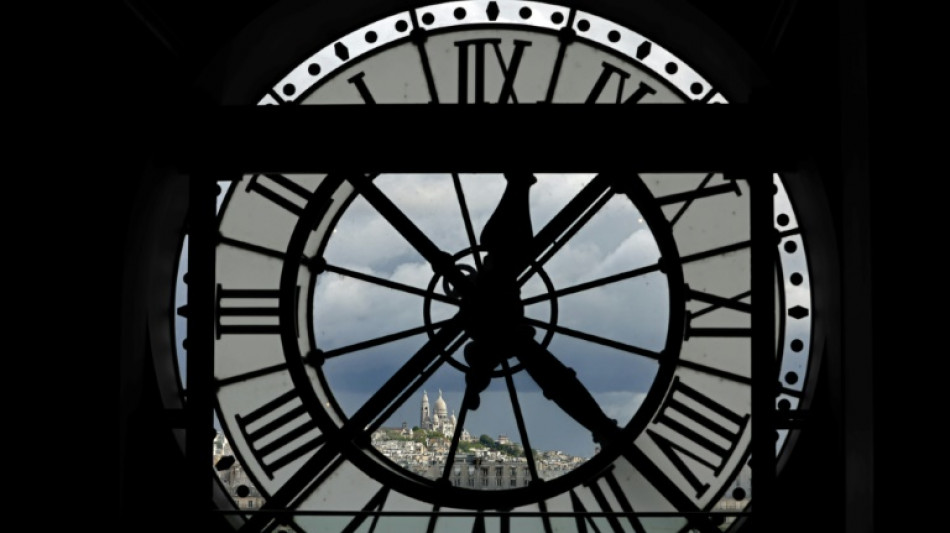
-
 Kohli, Padikkal guide Bengaluru to revenge win over Punjab
Kohli, Padikkal guide Bengaluru to revenge win over Punjab
-
US aid cuts strain response to health crises worldwide: WHO

-
 Birthday boy Zverev roars back to form with Munich win
Birthday boy Zverev roars back to form with Munich win
-
Ostapenko eases past Alexandrova into Stuttgart final

-
 Zimbabwe on top in first Test after Bangladesh out for 191
Zimbabwe on top in first Test after Bangladesh out for 191
-
De Bruyne 'surprised' over Man City exit

-
 Frail Pope Francis takes to popemobile to greet Easter crowd
Frail Pope Francis takes to popemobile to greet Easter crowd
-
Lewandowski injury confirmed in blow to Barca quadruple bid

-
 Russia and Ukraine accuse each other of breaching Easter truce
Russia and Ukraine accuse each other of breaching Easter truce
-
Zimbabwe bowl Bangladesh out for 191 in first Test in Sylhet

-
 Ukrainians voice scepticism on Easter truce
Ukrainians voice scepticism on Easter truce
-
Pope wishes 'Happy Easter' to faithful in appearance at St Peter's Square

-
 Sri Lanka police probe photo of Buddha tooth relic
Sri Lanka police probe photo of Buddha tooth relic
-
Home hero Wu wows Shanghai crowds by charging to China Open win

-
 Less Soviet, more inspiring: Kyrgyzstan seeks new anthem
Less Soviet, more inspiring: Kyrgyzstan seeks new anthem
-
Defending champion Kyren Wilson crashes out in first round of World Snooker Championship

-
 NASA's oldest active astronaut returns to Earth on 70th birthday
NASA's oldest active astronaut returns to Earth on 70th birthday
-
Exec linked to Bangkok building collapse arrested

-
 Zelensky says Russian attacks ongoing despite Putin's Easter truce
Zelensky says Russian attacks ongoing despite Putin's Easter truce
-
Vaibhav Suryavanshi: the 14-year-old whose IPL dream came true

-
 Six drowning deaths as huge waves hit Australian coast
Six drowning deaths as huge waves hit Australian coast
-
Ukrainian soldiers' lovers kept waiting as war drags on

-
 T'Wolves dominate Lakers, Nuggets edge Clippers as NBA playoffs start
T'Wolves dominate Lakers, Nuggets edge Clippers as NBA playoffs start
-
Taxes on super rich and tech giants stall under Trump

-
 Star Wars series 'Andor' back for final season
Star Wars series 'Andor' back for final season
-
Neighbours improvise first aid for wounded in besieged Sudan city

-
 Tariffs could lift Boeing and Airbus plane prices even higher
Tariffs could lift Boeing and Airbus plane prices even higher
-
Analysts warn US could be handing chip market to China

-
 Unbeaten Miami edge Columbus in front of big MLS crowd in Cleveland
Unbeaten Miami edge Columbus in front of big MLS crowd in Cleveland
-
Social media helps fuel growing 'sex tourism' in Japan

-
 'Pandora's box': alarm bells in Indonesia over rising military role
'Pandora's box': alarm bells in Indonesia over rising military role
-
Alaalatoa hails 'hustling hard' Brumbies for rare Super Rugby clean sheet

-
 Trio share lead at tight LA Championship
Trio share lead at tight LA Championship
-
Sampdoria fighting relegation disaster as old heroes ride into town

-
 Recovering pope expected to delight crowds at Easter Sunday mass
Recovering pope expected to delight crowds at Easter Sunday mass
-
Nuggets edge Clippers in NBA playoff overtime thriller, Knicks and Pacers win

-
 Force skipper clueless about extra-time rules in pulsating Super Rugby draw
Force skipper clueless about extra-time rules in pulsating Super Rugby draw
-
DEA MARIJUANA SCAM: As DEA Cannabis Program Implodes This 4/20, MMJ Stands Alone in Pursuit of Real Medicine

-
 Nuggets edge Clippers in NBA playoff overtime thriller, Pacers thump Bucks
Nuggets edge Clippers in NBA playoff overtime thriller, Pacers thump Bucks
-
Unbeaten Miami edge Columbus in front of big crowd in Cleveland

-
 Kim takes one-shot lead over Thomas, Novak at RBC Heritage
Kim takes one-shot lead over Thomas, Novak at RBC Heritage
-
Another round of anti-Trump protests hits US cities

-
 'So grateful' - Dodgers star Ohtani and wife welcome first child
'So grateful' - Dodgers star Ohtani and wife welcome first child
-
PSG maintain unbeaten Ligue 1 record, Marseille back up to second

-
 US, Iran report progress in nuclear talks, will meet again
US, Iran report progress in nuclear talks, will meet again
-
US Supreme Court intervenes to block Trump deportations

-
 Hamas armed wing says fate of US-Israeli captive unknown
Hamas armed wing says fate of US-Israeli captive unknown
-
Pacers thump Bucks to open NBA playoffs

-
 Sabalenka reaches Stuttgart semis as Ostapenko extends Swiatek mastery
Sabalenka reaches Stuttgart semis as Ostapenko extends Swiatek mastery
-
Zelensky says Ukraine will observe Putin's Easter truce but claims violations


Time to stop changing clocks? Not so fast, say EU states
The saying goes that time is money but in the European Union, time is political too.
When clocks spring forward across the bloc on Sunday, it will not be the last time despite a desire by millions of EU citizens to see the lights turned out on the biannual change.
Research shows that moving the clock back and forth in autumn and spring negatively impacts the economy as well as people's health, fuelling growing calls to end the system in Europe -- and beyond.
The EU proposed abolishing the custom in 2018 after nearly four million people in the bloc's then 28 member states -- before Britain formally exited -- gave their support in an open consultation.
The parliament -- the only directly elected EU body -- backed the reform the following year, but it has since fallen into limbo after hitting opposition from some EU states.
Under the EU's process to pass a law, the European Commission makes a proposal that the European Parliament and member states must vote on separately -- before negotiators for EU countries and MEPs agree on a final text.
Poland, which holds the bloc's rotating presidency until July, says it is time to put the issue back on the states' agenda.
Supporters including lawmakers point to studies proving the change harms health.
"There's a huge amount of evidence suggesting that changing the clock biannually is bad for human health, bad for animals, bad for road traffic, and has very little beneficial attributes. And it's also a huge inconvenience," said Irish EU lawmaker Sean Kelly.
"So I think the time has come to say bye-bye," said Kelly, one of the most vocal proponents of eradicating clock changes.
Kelly urges the EU to agree a target date to stop changing clocks, as it has done with objectives to cut greenhouse gas emissions.
- 'Clock is ticking' -
The practice of moving the clocks forward in spring -- to add an hour of light to the evening -- began with Germany in World War I and spread across Europe. The custom made a comeback in World War II, then fell by the wayside until the 1970s oil crisis -- when it was brought back to save energy, and stayed.
Detractors see the reform as a waste of time -- with the EU now battling major challenges from Russia's invasion of Ukraine to the threat of trade war with Washington.
But the commission remains hopeful, telling AFP there were no plans to scrap it.
"We believe that a coordinated solution is still achievable, and we encourage renewed discussions under the current presidency," commission spokeswoman Anna-Kaisa Itkonen said.
The Polish presidency says it is moving in that direction -- while conceding there has been limited support among EU countries.
"We are planning to informally consult member states to see whether it is still feasible to take the proposal forward," it said.
"As the clock is ticking, we will take our time to assess the situation."
- It's about time -
For Kelly, it's one issue where the EU and the United States may find some agreement.
After his reelection, Donald Trump said he wanted to get rid of Daylight Saving Time as "inconvenient" and "very costly" -- although he has since temperered his tone, calling it a "50-50 issue".
Trump's ally and tech billionaire Elon Musk jumped into the fray by asking his followers this month if they preferred an hour earlier or later -- were the change to go ahead.
The majority of the 1.3 million votes preferred the clocks to be set an hour later -- meaning the sun would both rise and set at a later point in the day all year round.
If the EU and the United States ever stop the clock on the current system, they won't be alone. In the past decade, Azerbaijan, Iran, Russia, Syria, Turkey and Uruguay have done away with Daylight Saving Time, according to the Pew Research Center.
But some have had regrets. Egypt eliminated the clock change in 2014 before reintroducing it nine years later to save energy.
The reform's EU supporters, meanwhile, may need to wait a little longer.
A senior Lithuanian official said the country will waste no time and make the issue a priority when it takes over the EU presidency in... 2027.
Ch.Kahalev--AMWN